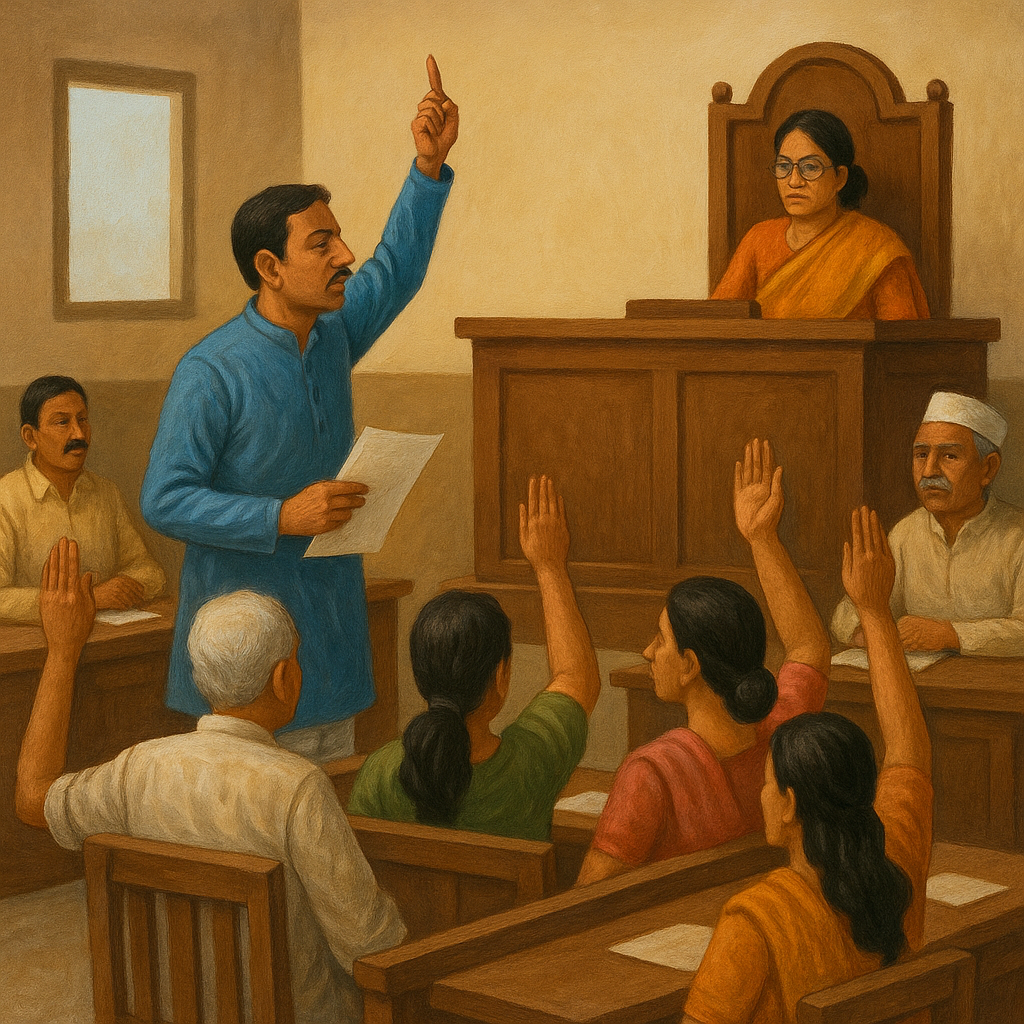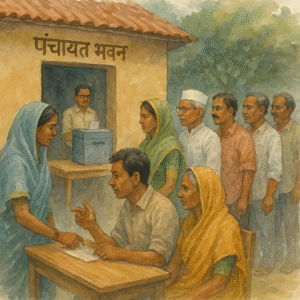The Patna High Court has clarified how a no-confidence motion against a Chief Councillor/Deputy Chief Councillor of a Nagar Parishad must be initiated and processed under the Bihar Municipal Act, 2007 and the Bihar Municipal No Confidence Motion Process Rules, 2010. In this writ petition (CWJC No. 8834 of 2020), the Court dismissed the challenge by the aggrieved person (the then Chief Councillor) and upheld the removal carried out through a special meeting where a majority of councillors supported the motion. The decision is significant for elected representatives, municipal officials, and citizens seeking to understand the procedural backbone of no-confidence motions in Bihar’s urban local bodies.
Simplified Explanation of the Judgment
The case arose from a no-confidence motion against the then Chief Councillor of a Nagar Parishad. Under Section 25(4) of the Bihar Municipal Act, 2007, a Chief Councillor/Deputy Chief Councillor can be removed by a resolution carried by a majority of the whole number of councillors at a special meeting convened for that purpose. The statute adds that the special meeting has to be called “in the manner prescribed,” and it incorporates a two-year bar: no such motion shall be brought within two years of assumption of office. The rule-making power is found in Section 419 of the Act, and the State has framed the Bihar Municipal No Confidence Motion Process Rules, 2010 to lay down the process.
Rule 2(i) of the 2010 Rules states that a special meeting for removal must be requisitioned and signed by not less than one-third of the elected councillors; this requisition is to be “given to the Chief Councillor.” On receiving the requisition, the Chief Councillor must issue the meeting notice within seven days and convene the meeting within fifteen days of issuing the notice. If the Chief Councillor fails to act, Rule 2(iii) permits the requisitionists to call the special meeting, with the notice issued by the Chief Municipal Officer, by reference to Section 48(3) of the Act.
Here, the municipal Executive Officer communicated on 16.10.2020 that fifteen ward councillors had submitted a written requisition expressing no confidence and requesting a special meeting. The aggrieved person received this communication on 20.10.2020 along with the requisition documents but did not issue the special meeting notice within seven days. A special meeting was then convened on 05.11.2020, the motion carried with 19 out of 26 councillors voting in favour, and a new Chief Councillor was elected on 09.12.2020.
The aggrieved person challenged (1) the 16.10.2020 letter and the underlying requisition, and (2) the subsequent meeting notice dated 29.10.2020, arguing that the requisition was not served on her directly, that an Executive Officer could not serve it, and that the two-year bar under the first proviso to Section 25(4) was violated if the process began before 16.10.2020. She further argued that Rule 2(iii) must be read with Section 48(2), meaning requisitionists could call a meeting only if the Chief Councillor failed to convene a meeting within 15 days of requisition by two-fifths councillors.
The Court rejected these arguments on facts and law. Factually, the Court found the statement that the requisition was not served to be false and misleading: the aggrieved person had acknowledged receipt on 20.10.2020 of the Executive Officer’s letter that enclosed the councillors’ requisition. This acknowledgement defeated the plea of non-service.
On law, the Court clarified that the “special meeting” for a no-confidence motion under Section 25(4) and the 2010 Rules is a self-contained process and is not controlled by Section 48(2) (which deals with general/requisitioned meetings by two-fifths councillors). Reference to Section 48(3) in Rule 2(iii) is only to empower requisitionists to call the special meeting when the Chief Councillor defaults, not to import the two-fifths requisition rule or the fifteen-day timeline from Section 48(2). In other words, under the no-confidence framework, the Chief Councillor must issue a notice within seven days on receiving the requisition; failure permits the requisitionists to proceed under Rule 2(iii) read with Section 48(3).
The Court also affirmed prior Patna High Court precedents that personal service of the requisition on the Chief Councillor is not mandatory. It is sufficient that the requisition be given to the Chief Councillor (or received on her behalf) and that she becomes aware and fails to act within the prescribed seven days. Here, by 20.10.2020 the aggrieved person indisputably knew of the requisition but did not issue the notice within seven days; the requisitionists were thus justified in calling the meeting.
Concluding that the process complied with Section 25(4) and the 2010 Rules, the Court dismissed the writ petition and imposed costs of ₹10,000 on the aggrieved person for attempting to mislead the Court.
Significance or Implication of the Judgment (For general public or government)
This judgment streamlines the practical steps for removing a Chief Councillor/Deputy Chief Councillor through a no-confidence motion in Bihar’s urban local bodies:
- It confirms that personal, hand-to-hand service of the requisition on the Chief Councillor is not required; documented receipt (including via an Executive Officer and with enclosures) is adequate to trigger the seven-day clock.
- It separates the special meeting process under Section 25(4)/Rule 2 from the general meeting requisition under Section 48(2), reducing confusion about timelines and thresholds (one-third councillor signatures for no-confidence requisition versus two-fifths for ordinary requisitions).
- It underlines the accountability of the Chief Councillor to act within seven days; if not, requisitionists may move ahead under Rule 2(iii) read with Section 48(3).
- It discourages litigation based on hyper-technical objections and false pleadings by imposing realistic costs.
For municipal governance, the decision promotes clarity, prevents unnecessary administrative paralysis, and respects the democratic will of the elected board when statutory thresholds are met.
Legal Issue(s) Decided and the Court’s Decision with reasoning
- Whether personal service of the requisition on the Chief Councillor is mandatory under Rule 2(i) of the 2010 Rules.
Decision: No. Personal service is not mandatory; what matters is that the requisition be given and the Chief Councillor becomes aware. Precedents of the Patna High Court support this position. - Whether the special meeting for a no-confidence motion under Section 25(4) is governed by Section 48(2) timelines/thresholds.
Decision: No. The no-confidence mechanism is self-contained in Section 25(4) read with the 2010 Rules. Section 48(3) is referenced in Rule 2(iii) only to empower requisitionists to call the meeting upon default by the Chief Councillor. - Whether failure of the Chief Councillor to issue a notice within seven days permits requisitionists to proceed.
Decision: Yes. On default, requisitionists may call the special meeting; the notice is then issued by the Chief Municipal Officer. - Whether the process in this case complied with law.
Decision: Yes. The aggrieved person received the requisition (through the Executive Officer) on 20.10.2020, did not act within seven days, the requisitionists validly convened the meeting on 05.11.2020, the motion carried by majority (19 out of 26), and a new Chief Councillor was elected on 09.12.2020. - Whether costs were warranted.
Decision: Yes. The Court found a false statement about non-service and imposed ₹10,000 as costs, payable to the successor Chief Councillor.
Judgments Referred by Parties (with citations)
- Sunita Devi v. State of Bihar & Ors., 2016 (1) PLJR 182.
- Sabila Khatoon & Ors. v. State of Bihar & Ors., 2017 (2) PLJR 29.
- Sheikh Hassmuddin & Anr. v. State of Bihar & Ors., 2015 (3) PLJR 203.
Judgments Relied Upon or Cited by Court (with citations)
- Amit Kumar & Ors. v. State of Bihar & Ors., C.W.J.C. No. 11142 of 2014, decision dated 22.07.2014.
- Rajeshwar Prasad v. State of Bihar & Ors., LPA No. 1077 of 2014, decision dated 04.08.2014.
- Nasima Khatoon v. State of Bihar & Ors. (coordinate Bench; citation not specified in text).
- Sunita Devi v. State of Bihar & Ors., 2016 (1) PLJR 182; Sabila Khatoon & Ors. v. State of Bihar & Ors., 2017 (2) PLJR 29 (reaffirmed).
Case Title
Jayanti Devi v. State of Bihar & Ors.
Case Number
Civil Writ Jurisdiction Case No. 8834 of 2020
Citation(s)
2021(2) PLJR 286
Coram and Names of Judges
Hon’ble Mr. Justice Chakradhari Sharan Singh (Oral Judgment dated 22.03.2021)
Names of Advocates and who they appeared for
- For the petitioner: Mr. Sarva Deo Singh
- For the respondents (municipal/private): Mr. S.B.K. Mangalam with Mr. Ravi Shanker Pankaj
- For the State: Mr. Rakesh Ambastha (AC to AAG 7)
Link to Judgment
MTUjODgzNCMyMDIwIzEjTg==-eeYIEyOqeCE=
If you found this explanation helpful and wish to stay informed about how legal developments may affect your rights in Bihar, you may consider following Samvida Law Associates for more updates.








